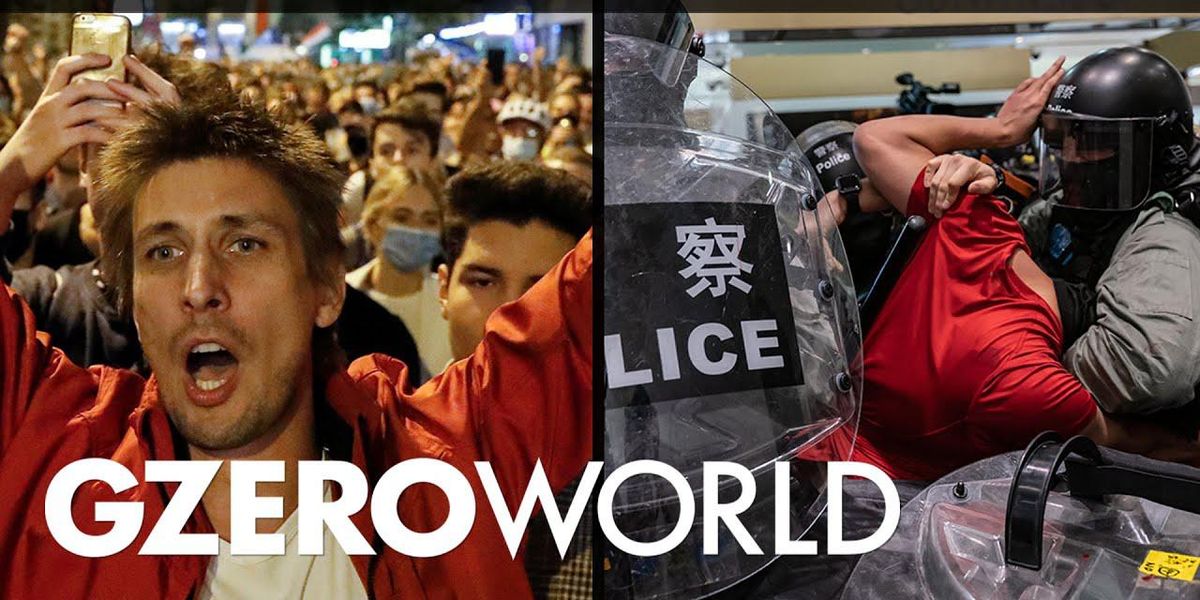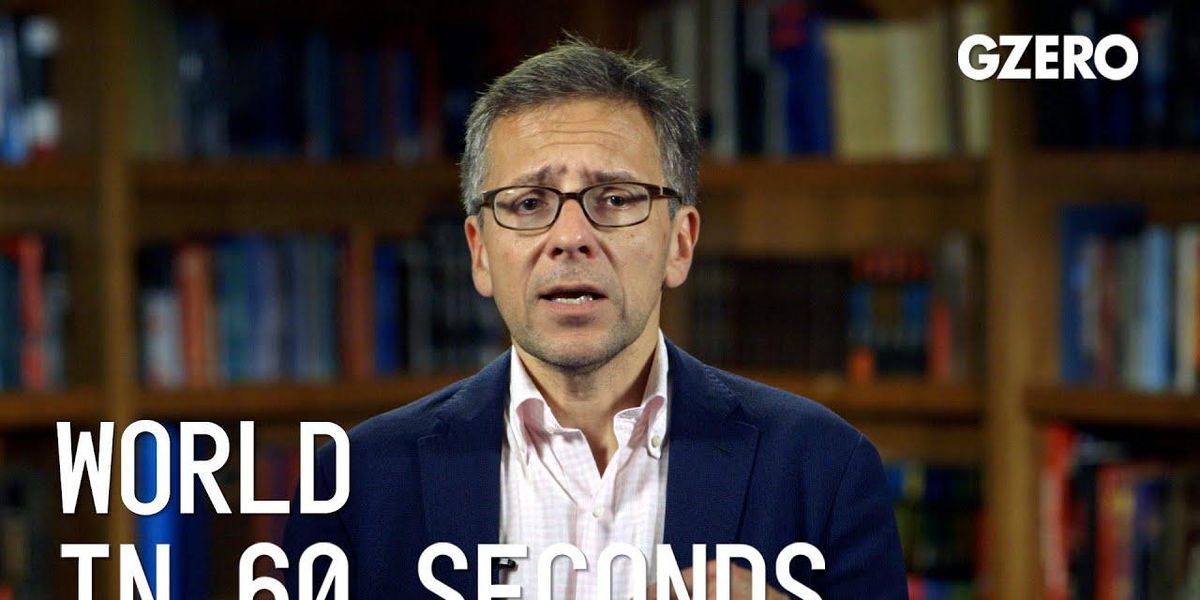Trending Now
We have updated our Privacy Policy and Terms of Use for Eurasia Group and its affiliates, including GZERO Media, to clarify the types of data we collect, how we collect it, how we use data and with whom we share data. By using our website you consent to our Terms and Conditions and Privacy Policy, including the transfer of your personal data to the United States from your country of residence, and our use of cookies described in our Cookie Policy.
{{ subpage.title }}
Fighting for democracy in Hungary and Hong Kong
Former Obama adviser Ben Rhodes sees parallels between Hungary's politics and what happened in the US under Trump, and believes the EU has been too lenient towards Prime Minister Viktor Orbán's autocratic tendencies. Rhodes, who met with democracy activists in Hungary and Hong Kong when researching his book, "After the Fall: Being American in the World We've Made," observes that Hungary's opposition groups have been strengthened by banding together to form a united front against corrupt politicians. There's less reason for hope in Hong Kong, says Rhodes, and one reason is that the US never made it a priority. "At every stage of the last 30 years, a commercial interest, or a security interest, or a geopolitical interest was always above what our interests were on an issue like Hong Kong," Rhodes tells Ian Bremmer on GZERO World.
Watch the episode: Is American democracy in danger?
- Hong Kong a year after the National Security Law; US-UK travel ... ›
- Ben Rhodes: the US should build a coalition to help Haiti's political ... ›
- Ben Rhodes: US can't say it defends democracy and then cozy up to ... ›
- Viktor Orban's authority in Hungary; uptake of contact-tracing apps ... ›
- Authoritarianism's enduring appeal: Anne Applebaum discusses ... ›
Hong Kong a year after the National Security Law; US-UK travel corridor
Ian Bremmer shares his perspective on global politics this week:
A year after the National Security Law, how has Hong Kong changed?
More integrated into mainland China. Virtually no Western companies have pulled out. A fair number of Hong Kong citizens are leaving, and of course no more democratic opposition, no more free media. The full incorporation of Hong Kong into mainland China. One country, one system is happening very fast.
As rebels retake the Tigray capital, Ethiopia declares a ceasefire. Is peace near in Ethiopia's civil war?
Early to say that. It's certainly a promising step. There's been a lot of pressure from the international community, the US and others, sanctions on the Ethiopian government, potential that the IMF program doesn't run forward. That would be a big problem for the Ethiopian economy. So they want to move to a ceasefire, but the Ethiopian Prime Minister, Abiy, is concerned that he doesn't have the military support for maintaining a ceasefire given the tense balance in Tigray. Certainly, with the Eritrean military across the border supporting them, it's going to be hard to keep that in place. But we will see where it goes.
Finally, is the hope of the US-UK travel corridor fading as the Delta variant forces more lockdowns around the world?
I know a lot of Brits want to come here and vice versa. I don't think so. Definitely the lockdowns are continuing through mid-July at the least in the UK, but again, the United States and UK have been some of the fastest in the world in terms of getting the entire population vaccinated. Yes, there are holdouts. Yes, there's anti-vax sentiment, but ultimately just as we're feeling like life is getting back to normal, that international transit between the advanced industrial economies is picking up soon. I'd be stunned if by the end of the summer we aren't traveling back and forth between the US and UK. Once again, special relationship, even post-Brexit.
- Beijing makes its move on Hong Kong - GZERO Media ›
- The Graphic Truth: Who supports China's Hong Kong law? - GZERO ... ›
- Ethiopia at war with itself - GZERO Media ›
- The Graphic Truth: Who depends the most on tourists? - GZERO ... ›
- Vaccine papers, please! - GZERO Media ›
- Who still welcomes American tourists? International travel in the era ... ›
- Fighting for democracy in Hungary and Hong Kong - GZERO Media ›
Beijing makes its move on Hong Kong
It looks like China's leadership has finally had enough of Hong Kong's pro-democracy movement.
In a speech on Thursday to the national people's congress, a symbolic confab of the country's ruling elite, Premier Li Keqiang announced a new national security law that would outlaw secessionist activity and criminalize foreign influence in Hong Kong. The measure, an explicit response to recent pro-democracy protests there, would also permit mainland China's security agencies to operate openly in the city.
The move caught Hong Kongers and the rest of the world almost totally by surprise.
If the law is passed, it would in practice end the "one country, two systems" arrangement between Beijing and Hong Kong that has existed since the territory reverted from British control to Chinese rule in 1997. Under that model, Hong Kong enjoyed special democratic and economic freedoms unknown on the mainland.
This isn't the first time Beijing has tried to impose a security law like this on Hong Kong. In 2003, a similar attempt provoked mass protests that forced Beijing to back down. But 17 years later, China's leadership has grown much more assertive — both at home and abroad — while Hong Kong's share of the now-massive Chinese economy has dwindled from nearly a fifth of GDP to less than 3 percent.
Establishing firmer control over Hong Kong, which is already within China but living under different laws, is in some ways a dress rehearsal for President Xi Jinping's larger ambition: reunification with Taiwan, which he has pledged to make happen by 2049.
The move could provoke fresh protests. It wasn't long ago that Beijing's attempt to subject Hong Kongers to the jurisdiction of the mainland's (highly politicized) courts touched off the largest demonstrations in the city's history. Those protests, some of which turned violent, fizzled out as the coronavirus pandemic began. But smaller scale ones have popped up again lately, and pro-democracy activists have responded to the new security law by sounding an urgent call to return to the barricades.
Will this inflame US-China ties?
They are in bad shape already, as Beijing and Washington blame each other for the pandemic, expel each other's journalists, and continue to "decouple" their economies. The Hong Kong move could make things worse. US Secretary of State Mike Pompeo called the new security law a "death knell" for Hong Kong's autonomy, and a related sanctions bill is already circulating in the US Senate. President Trump said the US would respond "very strongly" if the security law is implemented. But what, in practice does that mean? The US has limited tools to force China to behave differently within its own borders.
The bottom line: the coronavirus pandemic cooled things off in Hong Kong for a while, but Beijing just whipped out a blowtorch.
- What We’re Watching: Bolsonaro shuffles the deck chairs, new HK “election” rules, Catalan separatists bicker - GZERO Media ›
- What We’re Watching: Bolsonaro shuffles the deck chairs, new HK “election” rules, Catalan separatists bicker - GZERO Media ›
- What We’re Watching: Military pushback against Bolsonaro, new HK “election” rules, Catalan separatists bicker - GZERO Media ›
- Hong Kong a year after the National Security Law; US-UK travel corridor - GZERO Media ›

